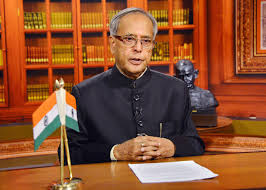Pranab Mukherjee was awarded the Bharat Ratna

Former president Pranab Mukherjee was awarded the Bharat Ratna, the country’s highest civilian honour, by President Ram Nath Kovind. Mukherjee, along with the late Assamese singer-composer Bhupen Hazarika and the late social activist Nanaji Deshmukh, had been conferred the honour on January 25. Hazarika and Deshmukh were given the Bharat Ratna posthumously.
Daily Current Affairs Quiz 2019
Vice President M Venkaikah Naidu, Prime Minister Narendra Modi, Home Minister Amit Shah, Defence Minister Rajnath Singh, several Union Cabinet Ministes, Assam Chief Minister Sarbananda Sonowal were among those present at the function held at the imposing Durbar Hall.
Mukherjee thanked Kovind for the honour, which he said was more for the people of the country from who he had received much more.
“My heartfelt gratitude to Rashtrapatiji and the people of our nation for bestowing the Bharat Ratna on me. This honour is more for the people of our country from whom I have received much more than I have been able to give,” Mukherjee said in a tweet.
Rajasthan Chief Minister Ashok Gehlot said, “Congratulations to the former President of India, Shri Pranab Mukherjee, for being awarded Bharat Ratna. He has served the nation selflessly for decades in myriad ways and has inspired an entire generation of politicians with his knowledge, wisdom and experience.”
The Bharat Ratna was conferred after a gap of four years. Former prime minister Atal Bihari Vajpayee and founder of Banaras Hindu University Madan Mohan Malviya were given the award by the Narendra Modi government in 2015.
Mukherjee, fondly known as ‘Pranab Da’, became the fifth president to receive this award. He was the president between 2012 and 2017.
Mukherjee, 83, served the country as its 13th President for five years from July 25, 2012, and emerged as a respected and admired leader whose words were heard with attention not only by those in power politics but by the common man as well. Mukherjee worked with two prime ministers — Manmohan Singh and Narendra Modi — and shared an excellent equation with both of them.
A quintessential Congressman who served for 23 years as a member of the Congress Working Committee, the highest policy-making body of the party, Mukherjee caused quite a stir by visiting the RSS headquarters at Nagpur last year even as some Congress leaders urged him not to do so. In his widely watched speech, he emphasised on India’s pluralism.
As president, Mukherjee laid a lot of stress on innovation and on boosting country’s rankings in higher education as none of Indian universities is in the top 100 rankings. He sought to start an eco-system that fostered creativity of young minds and valued innovations at the grassroots.
Widely respected across the political spectrum, Mukherjee strove for consensus in politics and served five times as a member of Rajya Sabha from 1969 and twice as a member of the Lok Sabha.
Known for his sharp memory, clarity of thought and grasp over issues, he has the rare distinction of serving as Foreign, Defence, Commerce and Finance Minister and was seen by many as a potential prime minister. He was also a Deputy Chairman of the Planning Commission.
As a minister in UPA governments from 2004 to 2012, Mukherjee was instrumental in spearheading critical decisions on a range of issues such as administrative reforms, Right to Information, Right to Employment, Food Security, energy security, Information Technology and telecommunication, setting up of UIDAI and Metro Rail through chairmanship of over 95 Groups of Ministers constituted for the purpose.
In seventies and eighties, he was instrumental in setting up regional rural banks (1975) and the EXIM Bank of India as well as National Bank for Agriculture and Rural Development (1981-82).
Mukherjee is also author of a modified formula for resource sharing between the Centre and the states in 1991 which came to be known as the Gadgil-Mukherjee formula.
Born in a small village of Mirati in Birbhum District of West Bengal, Mukherjee’s father was a Congress leader who endured great hardship, including being sent to jail several times for his role in India’s struggle for independence.
Mukherjee pursued history, political science and law from Kolkata University and embarked on his professional life as a college teacher and journalist. He served as a deputy minister and Minister of State for Finance in 1973-74 and became Finance Minister in 1982.
Mukherjee also served on the Board of Governors of the International Monetary Fund (IMF), World Bank, Asian Development Bank, and African Development Bank.
A prolific reader, Mukherjee has authored several books. He was conferred the Padma Vibhushan, India’s second highest civilian award, in 2008.
He has also been given the Best Parliamentarian Award in 1997 and Best Administrator in India Award in 2011. Mukherjee was rated one of the best five finance ministers in 1984, according to a survey conducted by the Euro Money journal.
Mukherjee enjoys reading, gardening and music in his spare time and is a dedicated patron of arts and culture.